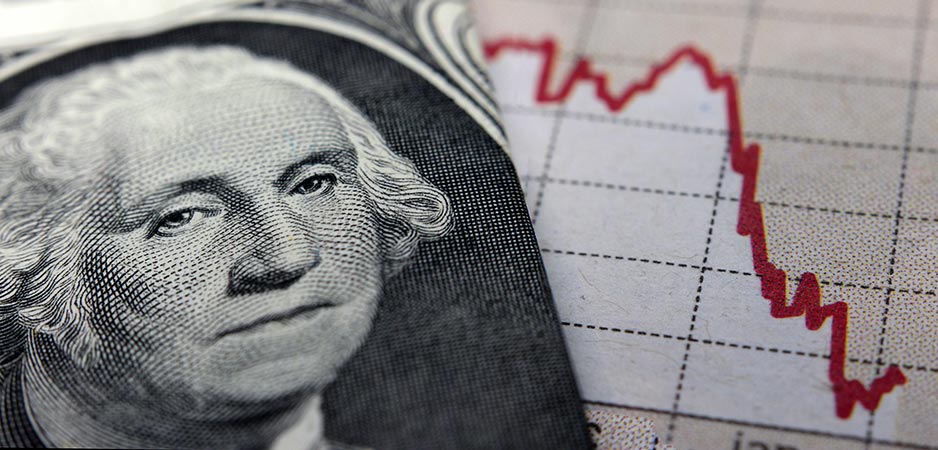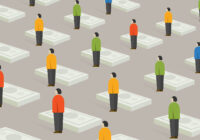Goldman Sachs has every reason to reassure its clients in the face of a crisis that nobody but its economists are capable of understanding. They are the world-renowned experts and the guides of those who have money to invest. Goldman Sachs’ track record speaks for itself. Nobody is closer to both financial data and political power than Goldman.
COVID-19 Outbreak Takes the Recession Debate to Brand New Territory
Hoping to defend business as usual in the face of what had been developing into a panic, Goldman Sachs organized a conference call to boost the morale of merchant banks by sharing its deeply researched wisdom with them. What Goldman did was to “downplay the coronavirus’ effects on the world economy” at perhaps the least opportune moment for its own credibility, at the very moment when political authorities across the globe began springing into action to restrict all non-essential economic activity and enforce the discipline of social distancing.
In a nutshell, this was Goldman Sachs’ message: “There is NO systemic risk. No one is even talking about that. … It feels more like 9/11 than it does like 2008.”
Here is today’s 3D definition:
Systemic risk:
Any possible or probable threat to the stability of a system that controls society or any other complex system, as seen from the point of view of someone who has a stake in the control system and who is likely to see anyone and anything outside that control system as potentially capable of destabilizing it
Contextual Note
To support its Alfred E. Neuman-esque message (“What, me worry?”), Goldman Sachs rolled out its data and compared the coronavirus pandemic with other known trends and historical patterns. It announced, for example: “The virus appears to be concentrated in a band between 30-50 degrees north latitude.” This implies that we should not think of it as a global threat. Goldman twice repeats the idea of “weighted towards the elderly” and acknowledge that elderly people may be “dying sooner due to respiratory issues,” which should reassure the banks, before warning that there actually is a small problem worth troubling about because it “may however stress the healthcare system.”
The Goldman Sachs experts then went on to admit that, in the short term, there would be a very real negative effect on the economy. But the acknowledgment led them to draw this extraordinary conclusion — that “the real damage is driven mostly by market psychology.” To prove their point, they appeal to everyone’s general knowledge of history: “Viruses have been with us forever. Stock markets should fully recover in the 2nd half of the year.” In other words, people die — sometimes more than usual — but the Dow Jones will always be there for those who care about humanity.
Then, before reaching their final conclusion concerning the absence of systemic risk, the Goldman experts reminded their clients of another important historical point: “Technically the market generally has been looking for a reason to reset after the longest bull market in history.” In earlier times, analysts might at this point have been tempted to add that it’s God’s will. The subtext here is that there will soon be real opportunities for investment.
The conference call took place on March 12, the same day that Congress was debating with the White House the question of paid leave and French President Emmanuel Macron was lauding the welfare state and announcing a generous policy of compensation to all people affected by what was clearly about to become a knockout blow to the economy.
Goldman Sachs seems to have chosen the last possible moment to credibly sound both scientific and reassuring about something that, in the following days, moved to a much higher level of magnitude. Did its experts really believe what they were telling their clients? On March 17, conjointly with Morgan Stanley and the rest of Wall Street, Goldman Sachs declared that “the coronavirus has triggered a global recession.
In its reporting, Fortune magazine updates the forecast of slowed global growth corresponding to a recession and adds this comment: “The outlook could darken even further if the virus lasts longer than anticipated or wields greater economic pain—given factories, schools, restaurants and shops are closing around the world.”
Attentive observers should notice that none of these experts have mentioned the cost to human lives, not just of the disease, but especially as the consequence of the economic chaos that will endanger tens of millions of peoples’ very subsistence. But once again, what really matters is what the Dow Jones will look like once the storm has passed.
Historical Note
One analyst sees Goldman’s assessment as “a case of denial born of recency bias.” The author makes a mathematical case for comparing the current stock market crash with the most famous crash of all time: 1929. Complaining that “there is a strong and persistent tendency to regard the current action as merely an anomalous overreaction to the coronavirus pandemic,” he maintains that the “recent market decline is a symptom of a fundamental Secular Shift in markets, economics, domestic and international politics and society” that he compares “to that announced by the crash of 1929.”
The crash of 1929 ushered in the Great Depression, which led to Franklin D. Roosevelt’s Keynesian-inspired New Deal that effectively instilled new hope and confidence in the US economy, though it failed to achieve a decisive return to prosperity. That may constitute a true historical case of the effect of “market psychology” rather than economic reality. The psychology of the New Deal was positive because it saved US capitalism from collapse even if it solved none of the structural problems.
Most historians believe that it was the investment in the war effort after the attack on Pearl Harbor in 1941 that put the US economy back on track. And as the late political scientist Chalmers Johnson observed, the economic success that resulted from the war effort convinced the post-war governments of the US that, to keep the economy humming, they should continue in the same vein and remain on a war footing. That gave the world the Cold War. It also led to the never-ending development of the military-industrial complex that still dominates the US economy.
Johnson explained that this state of affairs came about through a conscious effort to put in place a permanent policy of what he terms “military Keynesianism.” Here is how he defines it: “[T]he mistaken belief that public policies focused on frequent wars, huge expenditures on weapons and munitions, and large standing armies can indefinitely sustain a wealthy capitalist economy.” Johnson added this pithy comment: “The opposite is actually true.”
Goldman Sachs told its clients that this time it wouldn’t be like 2008. Its experts instead invoked 9/11 to reassure their clients. Why did they find it necessary to distance themselves from the financial crisis of 2008 and prefer to invoke the specter of global terrorism? Could it be that they were embarrassed about what happened to their own company at a time when Bear Stearns and Lehman Brothers had already bitten the dust?
In 2018, PBS’ program “Frontline” asked this question: “So did the government fail to anticipate the systemic risks posed by Lehman Brothers? And why wasn’t more done to save Lehman Brothers?” Bear Stearns had already collapsed and was not bailed out. Now it was Lehman’s turn. Something truly systemic was going on.
As for Goldman Sachs, in October 2008, before the next domino could fall, Warren Buffett stepped in to inject $5 billion into Goldman Sachs, which like the others was teetering, despite all its precious market expertise. As CNBC reported it at the time, “it will receive a $5 billion infusion from Warren Buffett’s Berkshire Hathaway, an investment that could also raise confidence in the venerable Wall Street firm and the financial markets in general.”
Buffett spared the government the task of intervening with a bailout to save Goldman Sachs and thereby saved Wall Street itself. The stock market itself might not have recovered if Goldman, with its iconic status, had succumbed. But Buffett wasn’t ready to act without the government’s assistance. Like any smart investor, he needed guarantees.
As CNN reported, “the legendary investor said his faith in the financial markets’ recovery is contingent on Congress passing the $700 billion bailout, which would buy troubled mortgage assets from banks.” This meant that the taxpayers would provide the cash to cancel the risk of the investment. As usual, once the smoke had cleared, Buffett, profiting from the fact that the bank had lost share value, made a very handsome profit out of the operation.
But the systemic logic didn’t stop there, as CNN reported: “The investment bank can use the money to scoop up smaller banks at cheap prices, analysts said.” Buffett would win on two levels and gain a degree of influence over the economy that even he had never been able to achieve.
Today’s Goldman Sachs certainly hasn’t forgotten the logic of that key moment in history, which it would rather not draw to anyone else’s attention. Neither, we should suppose, has Buffett forgotten it. As the market collapses this year thanks to the coronavirus pandemic, Buffett’s Berkshire Hathaway is once again waiting in the wings as it sits on $125 billion in cash. Observers have at least for the past two years been wondering when and where Buffett might go on a new spending spree, but he has played coy with a rising market (thanks largely to quantitative easing and US President Donald Trump’s tax cuts).
The world can breathe easy now because, no matter how many people die or are ruined by the effects of the economic lockdown, the virus will run its course. If this year’s crisis is as bad as the medical experts say — even as Goldman Sachs continues to affirm (in public) that it isn’t worth worrying about —Buffett will be there to step in and pick up the most profitable morsels that end up scattered on the trading room floor. Unless, given that he is more vulnerable than most people as he approaches the age of 90, the coronavirus finds its way into the oracle of Omaha’s bloodstream before the stock prices reach the price point that will trigger his perfectly evaluated buy orders.
*[In the age of Oscar Wilde and Mark Twain, another American wit, the journalist Ambrose Bierce, produced a series of satirical definitions of commonly used terms, throwing light on their hidden meanings in real discourse. Bierce eventually collected and published them as a book, The Devil’s Dictionary, in 1911. We have shamelessly appropriated his title in the interest of continuing his wholesome pedagogical effort to enlighten generations of readers of the news.]
The views expressed in this article are the author’s own and do not necessarily reflect Fair Observer’s editorial policy.
Support Fair Observer
We rely on your support for our independence, diversity and quality.
For more than 10 years, Fair Observer has been free, fair and independent. No billionaire owns us, no advertisers control us. We are a reader-supported nonprofit. Unlike many other publications, we keep our content free for readers regardless of where they live or whether they can afford to pay. We have no paywalls and no ads.
In the post-truth era of fake news, echo chambers and filter bubbles, we publish a plurality of perspectives from around the world. Anyone can publish with us, but everyone goes through a rigorous editorial process. So, you get fact-checked, well-reasoned content instead of noise.
We publish 2,500+ voices from 90+ countries. We also conduct education and training programs
on subjects ranging from digital media and journalism to writing and critical thinking. This
doesn’t come cheap. Servers, editors, trainers and web developers cost
money.
Please consider supporting us on a regular basis as a recurring donor or a
sustaining member.
Will you support FO’s journalism?
We rely on your support for our independence, diversity and quality.






